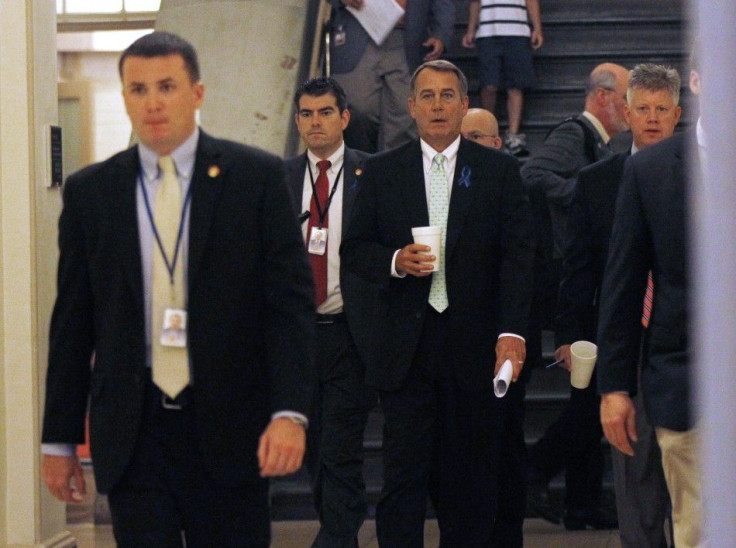As Default Approaches, Parties Remain Polarized

Analysis
With the United State less than seven days from a damaging default, leaders of both major political parties are scrambling to see if it's possible to cobble-together a debt deal -- one that bridges the ideological divide that's dominated Washington discourse for a long time.
However, even at this late stage, Republicans and Democrats are still digging their heels with on some key demands and are still blaming each other for putting politics ahead of the national interest.
House Speaker John Boehner, R-Ohio, is attempting last-minute changes to his deficit reduction bill, seeking to neturalize concerns that it doesn't cut the $1.2 trillion government spending his outline indicated. Tea Party conservatives said they would oppose Boehner's original outline.
Meanwhile, the Obama Administration is said to be preparing a debt reduction "Plan B," Reuters reported Wednesday. Previously, President Barack Obama said he was throwing his support behind Senate Majority Leader Harry Reid's, D-Nev., $2.7 trillion plan, calling it a "balanced approach" to deficit reduction, Reuters reported Wednesday.
All the while, Washington policy makers and Wall Street investors continued to warn that the two political parties were testing institutional investor patience to the limit -- "pushing it" is the chic phrase of the moment, according to one policy official.
However, so far, stock and bond investor reaction has been muted, while also concerned. Asia's market's early Wednesday showed no signs of panic, the dollar was actually slightly higher versus. the euro at $1.4459, and the benchmark 10-year U.S. Treasury bill was virtually unchanged at 2.96%.
The U.S. Congress has until the end of Aug. 2 to raise the U.S. debt ceiling to enable the government to pay its bills and service any debt due.
On Aug. 4, the U.S. Treasury Department is due to pay off $30 billion in maturing short-term debt. In theory, the United States could prioritize debt payments, but U.S. Treasury Secretary Timothy Geithner has warned lawmakers in Congress that the prioritization tactic would still cause investors to shun U.S. Treasury securities, commonly known as Treasuries.
Geithner has also repeatedly underscored that failing to raise the debt ceiling will have no constructive outcomes for the nation's fiscal condition, the task of deficit reduction, and U.S. and global stock and bond markets.
U.S. Federal Reserve Chairman Ben Bernanke has also said a failure to raise the debt ceiling would trigger a "huge financial calamity" that would send a "financial shockwave" throughout the global financial system.
Political/Public Policy Analysis: At this late stage, about the best one can say about the goings-on in Washingon is, 'at least lawmakers are still working on deals.' The problem is, their respective plans appear to be in different universes. Speaker Boehner is modifying a plan that's likely to be vetoed by Obama, even if it passes the Senate, will is not a certainty.
Meanwhile, Reid and the Obama administration are working on plan that's likely to be opposed by most if not all Tea Party members in the House. Hence, if Democrats can't recruit other veteran House Republicans to support Reid's bill, that bill, too, will fail.
And the default clock keeps ticking. What's needed is a bicameral effort, with all party leaders at the table, to at least raise the debt ceiling, then work out at substantive deficit reduction plan.
Based on the above disappointing progress at this late stage, on a scale of 0 to 100 percent, the likelihood of a U.S. Government default has been increased to 40 percent on Wednesday morning, up from 25 percent Tuesday night.
© Copyright IBTimes 2025. All rights reserved.





















